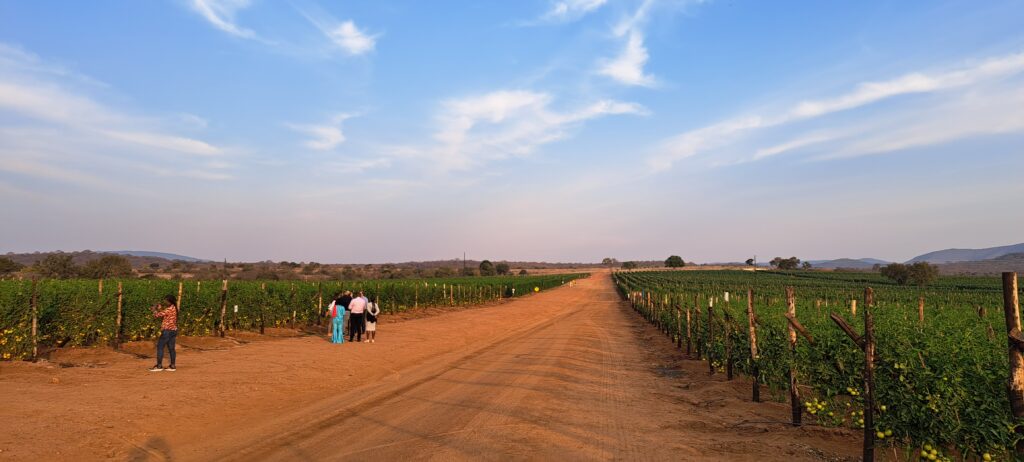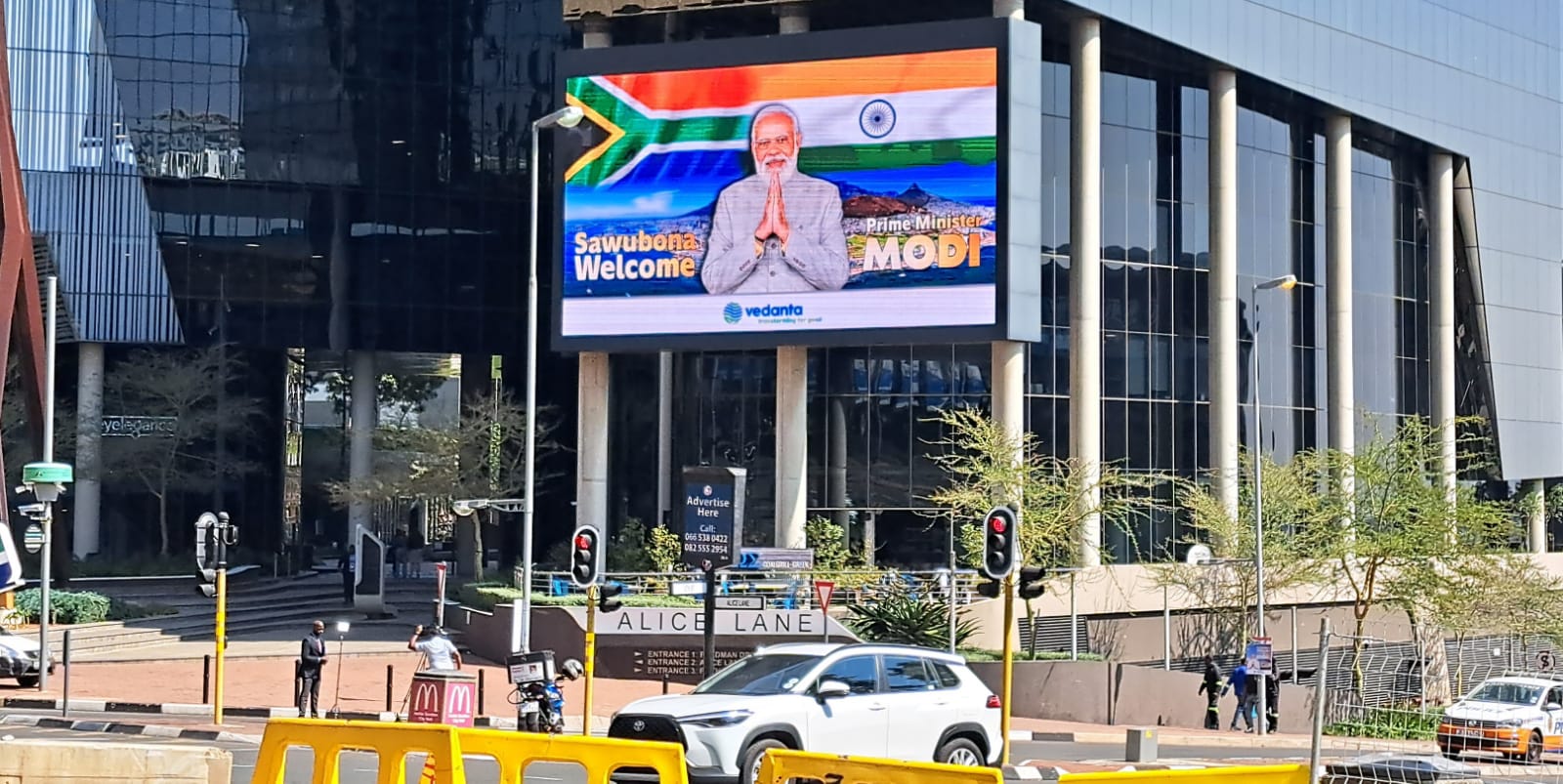JOHANNESBURG
After expansion, BRICS becomes a powerful group of growth economies of the world.

After an hour’s flight north from Johannesburg, I landed at the small airport of Hoedspruit town. Built within a private game reserve, the airport allows access to the great savanna region of South Africa. I took a two-hour drive away on excellent roads, cutting through vast stretches of protected grasslands to visit the ZZ2 Farming Company. Run by the Van Zyl family for generations, the farm now is among the largest producer of tomatoes in the world. ZZ2 also produces avocados and a range of fruits, including cherries and dates.

Already an exporter, ZZ2 is now poised to expand its business across the world as South Africa enhances its position in the BRICS grouping. The farming company uses cutting edge technologies to enhance its output and yield. ZZ2 uses smart plant sensors to monitor the growth of its crops. “The plant sensors ensure that we don’t over or under irrigate the plants. Each row gets the right amount of water to ensure optimum yield,” Tommie Van Zyl, CEO of ZZ2, told me as we stood among long rows of lush green tomato plants. Marketing head Clive Garrett said that tariff agreements between South Africa and BRICS countries will further enhance agricultural trade within the group. “For instance, mangos from India could be imported to South Africa while our avocados could be sent to India at much lower prices,” Garrett explained to me.
My recent visit to South Africa for the BRICS Summit allowed me a good view of the economic abilities of the country. Agricultural products are among the many strengths of the South African economy which is now keen to globalize further while investing in its own economic infrastructure.
The BRICS Summit hosted by President Cyril Ramaphosa in the sparkling Sandton town of Johannesburg capital region marked a significant turning point in global politics. The expansion of BRICS to include Argentina, UAE, Iran, Egypt, Saudi Arabia and Ethiopia carries deep implications for a world grappling with poly-crises. These countries will join the grouping from January 2024.
The expanded BRICS will include the world’s fastest growing economies amounting to about 30% of global GDP worth over $30 trillion. Moreover, these economies are also among the top producers of oil in the world.
New and distinct lines are emerging in the global economy. While global institutions categorise the world into developed and developing economies, I would describe them in a more contemporary manner. The developed countries of the Global North should be described as legacy economies. The developing countries of the Global South should be termed as growth economies. A quick glance at the GDP growth ranking shows that the fastest growing economies are no longer in the Americas or Europe. The legacy economies are larger in size but appear to have peaked in their growth curve. The growth economies may be relatively small but rising fast and are brimming with billions of new consumers. These consumers will drive them to accelerated growth fuelled by new technologies.
After expansion, BRICS will become a powerful group of growth economies of the world. The economies are populous and also immensely influential in global business routes. Egypt has the Suez canal, UAE is a global aviation hub, while Argentina and Brazil drive the South American economy. And South Africa is the link between countries of the southern hemisphere.
Three deep shifts are likely to occur as a result of the expansion.
- Stronger demand for multilateral reforms
- Enhanced use of regional currencies
- Increased collaboration among growth economies
In itself, the BRICS grouping has its internal contradictions. India and China relations are tense. Iran and Saudi Arabia joust over regional supremacy. Egypt and Ethiopia have a history of war and continuing dispute over the river Nile.
But they may be willing to rise above these regional issues to demand a stronger say in the global order. What is common between them is the urge to decide their own destiny in an increasingly multi-polar world. At a time when North America and European Union are grappling with slowdown, the growth economies are demanding a voice in institutions like the UN and World Bank. The BRICS Declaration has demanded the inclusion of Brazil, India and South Africa in the Security Council of the United Nations.
A common currency is not a feasible idea but the use of local currencies within the expanded BRICS will rise and deepen financial linkages among these countries. “We have noted that there is global momentum for the use of local currencies, alternative financial arrangements and alternative payment systems. As BRICS, we are ready to explore opportunities for improving the stability, reliability and fairness of the global financial architecture,” South African President Ramaphosa said in a statement. “The Summit agreed to task the BRICS Finance Ministers and/or Central Bank Governors, as appropriate, to consider the issue of local currencies, payment instruments and platforms and report back to the BRICS leaders by the next Summit.”
Even as trade linkages will increase, the BRICS grouping plans to enhance linkages in critical sectors. India’s Prime Minister Narendra Modi proposed collaboration for space exploration, confident with the success of Chandrayaan 3 Mission. Modi pitched the idea of establishing a BRICS space exploration consortium. “We are already working on the BRICS satellite constellation, but to move a step further, we should think aboutestablishing a BRICS space exploration consortium,” Modi said.इस शब्द का अर्थ जानिये
The growth economies of the world are uniting with a common cause with BRICS. As I returned to Delhi from Johannesburg via Addis Ababa, it appeared that I had witnessed a key turning point for the global economic order. Deeper collaborations could form among growth economies that don’t want to remain overly dependent on legacy economies.
Pranjal Sharma is a geo-economic analyst and author based in New Delhi.

